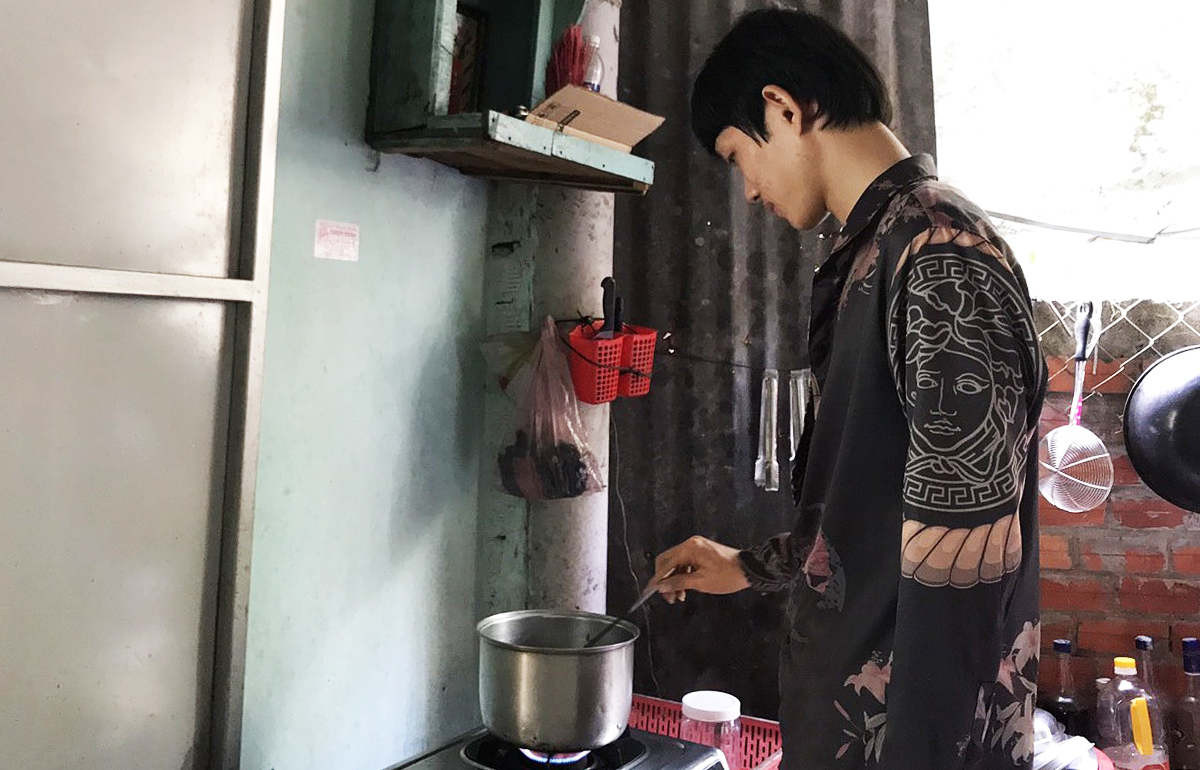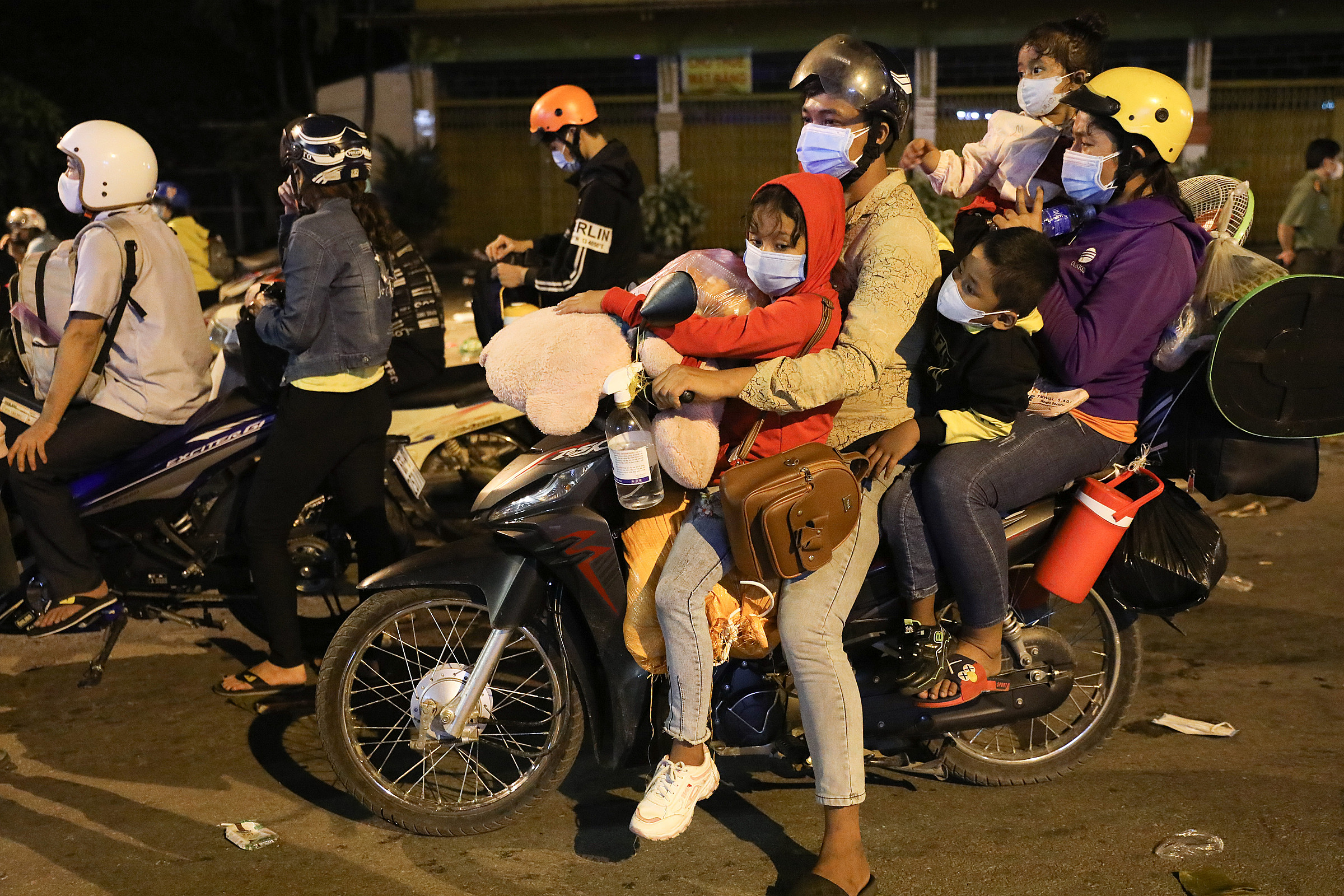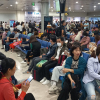Many migrant workers have decided to stay in their hometowns until after the Lunar New Year holiday instead of returning to Ho Chi Minh City for work.
Dang Hoang Tan, 27, returned to his hometown in the Mekong Delta province of Vinh Long 3.5 months now.
He used to work for a garment factory in HCMC’s Hoc Mon District.
When the Covid-19 outbreak was brought under control across the industrial hubs of the city and neighboring provinces of Binh Duong and Dong Nai, all localities hit hardest by the fourth wave, social distancing measures were eased in early October, and tens of thousands of migrant workers decided to return to their hometowns.
In most cases, returnees explained they had run out of money after losing their jobs due to the Covid-19 outbreak, and that home was their safest bet. Besides, they were all afraid of yet another outbreak with restrictions loosened, which means they would remain stuck in their small rented rooms under strict social distancing with zero income and greater fear of the pandemic.
Tan was no exception.
With HCMC the epicenter of the wave, which hit Vietnam in late April, the factory where Tan worked had been shut for three months.
He was not allowed out of his boarding house since it was put under lockdown after cases were detected inside. Later on, the entire city was put under the strictest social distancing measures, and everyone was required to stay where they were.
“I was still haunted by the feeling of being locked in a rented room and constantly learning information about people dying from the pandemic.”
When the city announced to reopen on Oct. 1, he did not hesitate to drive his motorbike all the way home to Long Ho District of Vinh Long Province, more than 140 kilometers (87 miles) from Hoc Mon.
 |
|
Dang Hoang Tan at his house in Vinh Long Province, January 2022. Photo by VnExpress/An Phuong |
At first, he intended to stay home for two weeks to recover, but gave up the idea after seeing the outbreak in HCMC and the entire southern region remain complex.
The garment company has more than once called him to return to work since Oct. 1 but Tan refused.
“I’m going to stay home until after the Tet holiday and make plans to return to HCMC later,” he said.
Tet is the biggest and most important holiday of Vietnamese people, during which they celebrate a new lunar year and reunite with loved ones. This year, Vietnam allows laborers a nine-day Tet break, from Jan. 29 to Feb. 6.
After 10 years of migrating to HCMC for work, Tan has never stayed unemployed for such a long period of time.
However, he is not worried as “there will be plenty of jobs waiting in the city” after the outbreak. The company he used to work for is also willing to take back skillful workers.
“I still have some money left and that’s enough for me to spend Tet with my mother. There’re various food sources in the countryside and I don’t have to pay for rent, so there is no need to rush,” he said.
With a scale of more than 2,000 employees, Saigon Food JSC in VinhLoc Industrial Park of HCMC’s Binh Chanh District lacks around 400 since the fourth wave hit, and after most laborers went home in early October.
With the holiday season approaching, the company has asked many to return to work and offered them welfare policies but still, has failed to attract any.
“Around half of those that left for their hometown agreed to return to work but said it will not be until after Tet. In most cases, they’re still worried about the pandemic situation and wanted it to get more stable to move back to HCMC,” said a representative from Saigon Food JSC.
 |
|
A family return home in the Mekong Delta from HCMC on September 30, 2021. Photo by VnExpress/Quynh Tran |
According to a survey by job search engine Viec Lam Tot (good jobs), waiting until after the Tet break to return to the city and apply for a new job is the trend.
At the end of last year, while businesses increased new hires by more than 160 percent compared to the period before the fourth wave, demand for jobs dropped by 45 percent.
Data from the HCMC Center of Forecasting Manpower Needs and Labor Market Information (FALMI) shows companies in the city are in need of at least 45,000 laborers for the first quarter this year. Of them, 70 percent are for the garment, leather and shoes, electromechanics and electronics, processing and commercial industries, which offer salaries of VND7-15 million ($310-660) a month.
However, there are only around 19,600 looking for new jobs in January.
Do Thanh Van, deputy director of Falmi, said apart from laborers who had left after the reopening, HCMC also faced a shortage of additional sources of laborers, which include college and newly-graduated students.
Under Covid-19 impacts, all schools have had to switch to online studies and many students in other provinces have remained in their hometowns for months, having yet to return to school.
However, Van believes the labor market will thrive after Tet when many solutions to support laborers are carried out.
The city is applying social media and online job exchanges to approach and introduce jobs to employees.
The Ministry of Labor, War Invalids and Social Affairs is coordinating with localities to support migrants with transportation fees, free testing, and vaccines.
Workers will be helped with minimum living expenses, travel, medicine, during the transition period, according to the ministry.
Tran Minh Ngoc, director of the Viec Lam Tot site, said the labor market will become balanced after Tet.
For now, the group of migrant workers that have returned to their hometowns prefer to freelance or do unofficial jobs. However, this will not be a long-term trend since there are not as many job options in those provinces.
Ngoc recommended laborers take advantage of the year-end period because of high market demand, which means they will have many job and salary options to choose from amid less competition.
On the contrary, if waiting until after Tet, job seekers will have to compete with other candidates, the possibility of being admitted will reduce and it would take more time to acclimatize to a new job environment, she said.
- Reduce Hair Loss with PURA D’OR Gold Label Shampoo
- Castor Oil Has Made a “Huge” Difference With Hair and Brow Growth
- Excessive hair loss in men: Signs of illness that cannot be subjective
- Dịch Vụ SEO Website ở Los Angeles, CA: đưa trang web doanh nghiệp bạn lên top Google
- Nails Salon Sierra Madre
 VnExpress News The News Gateway of Vietnam
VnExpress News The News Gateway of Vietnam




